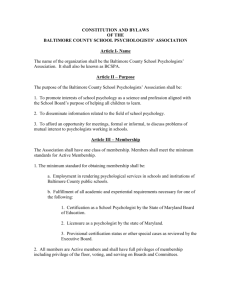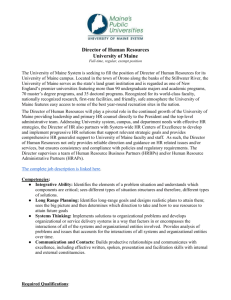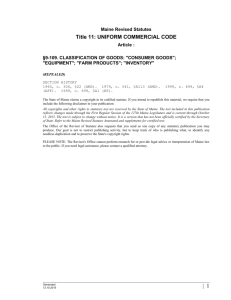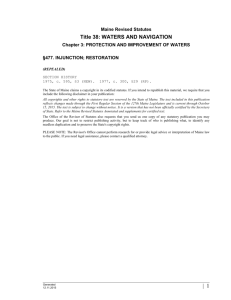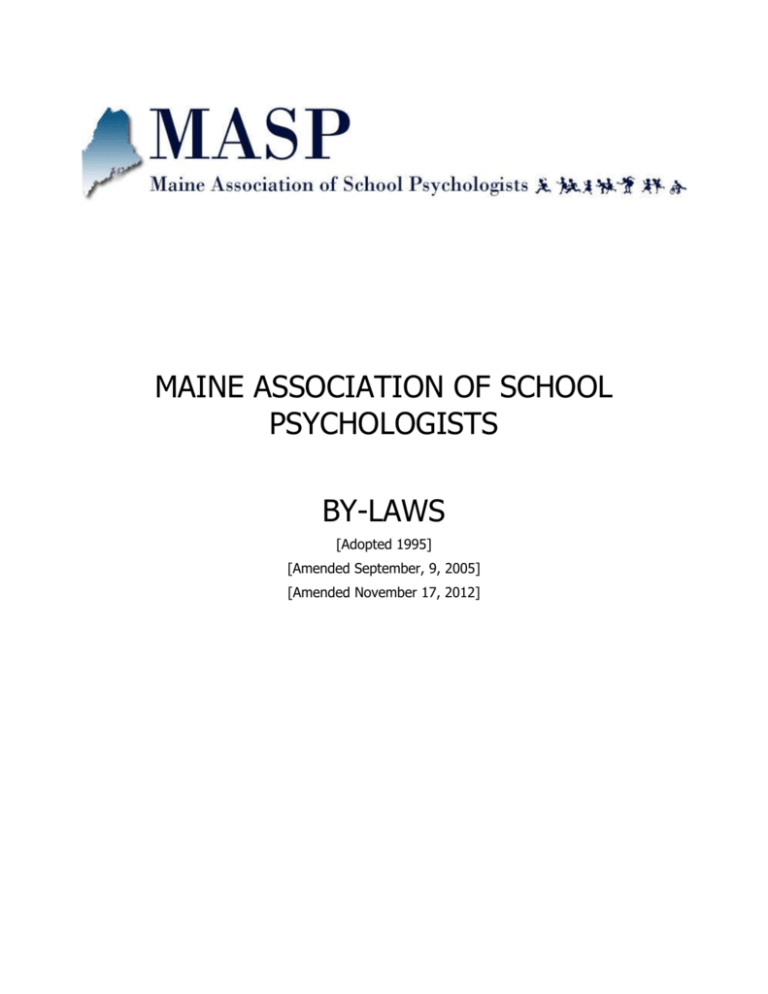
MAINE ASSOCIATION OF SCHOOL
PSYCHOLOGISTS
BY-LAWS
[Adopted 1995]
[Amended September, 9, 2005]
[Amended November 17, 2012]
ARTICLE I - Name of Organization
A. The name of the organization shall be the Maine Association of School Psychologists.
ARTICLE II - Purposes
A. To promote the highest standards of ethics, training, and practices in the provision of school
psychology services in the public and private schools of Maine.
B. To promote quality education and mental health for all children.
C. Inform the public about the services and the practice of school psychology.
D. Encourage and provide opportunities for the professional growth of individual members.
ARTICLE III – Membership
A. Categories of Membership
1. There shall be four categories of dues paying members in this Association: Regular
Member, Associate, Student and Retired.
2. Minimum qualifications for regular membership to this Association shall be certification
by the Maine Department of Education as a School Psychologist Specialist, or current
certification by the National Association of School Psychologists as a Nationally Certified
School Psychologist, or licensure by the Maine Board of Examiners of Psychologists as a
Licensed Psychological Examiner, or Liscenced Psychologist.
3. Associate membership status will be afforded to other persons who do not meet the
eligibility requires of the other membership categories and may include those functioning
as a school psychologist without a school psychology credential, consultant, or supervisor
of psychological services; faculty at a school psychology graduate program; or allied
professionals, or undergraduate or graduate students, with a strong affiliation to school
psychology, who support the work of the profession and wish to convey their affiliation
and commitment through membership in the Association.
4. Student members shall be persons actively enrolled in a school psychology graduate
program at least one-half time or a minimum of six semester hours or its equivalent per
semester. Student membership is not available to those employed full time in the
profession.
5. Retirement members shall be persons who are age 50 or older and have retired from full
time remunerative professional activity but may be consulting or involved in other paid
professional actively less than 15 hours a week.
B. Statement of Rights and Privileges
1. All membership categories of the Association shall be entitled to attend and participate
in all meetings of the Association, to receive publications and newsletters, and to serve on
various committees.
2. Voting rights are reserved for regular, student, and retired members only.
ARTICLE IV – Executive Board
A. Executive Board Members
1. The Executive Board shall be established and be comprised of Association Officers,
Standing Committee Chairs, and the Maine Delegate to the National Association of
School Psychologists.
2. The Officers of the Association shall be President, President-Elect, Past President,
Secretary, Treasurer, and the Maine Delegate to the National Association of School
Psychologists. The duties of the officers of the Executive Board shall include the
following:
a) President
i. Preside at all general meetings of the Association
ii. Serve as chairperson of the Executive Board and determine the date, time, location
and agenda for Executive Board Meetings.
iii. Annually appoint the Secretary, the Treasurer and Member(s)-at-Large with advice
and approval from Executive Board
iv. Serve as the official spokesperson for information about or positions approved by
the Association.
v. Serve as an ex-officio member of all standing or ad-hoc committees, and appoint
such committees as deemed necessary.
vi. Shall serve for a two-year term, commencing on the first day of July following
election to the last day of June in the biannual year.
b) President-Elect
i. Serve as an officer and member of the Executive Board.
ii. Serve as chairperson of the Executive Board in the absence of the President.
iii. Succeed the President when (s)he can no longer serve, assuming the duties of
President until the time of the next regularly scheduled election.
c) Treasurer
i. Serve as an officer and member of the Executive Board.
ii. Maintain records of financial transactions and financial status of the Association.
iii. Make financial reports to the Executive Board at every meeting.
iv. Prepare a written financial summary report to the general membership on an
annual basis.
v. Maintain the membership roster.
d) Secretary
i. Serve as an officer and member of the Executive Board.
ii. Maintain a written record of the minutes of each Executive Board meeting and the
official business meeting of the Association.
iii. Prepare, submit, and maintain copies of minutes to the Executive Board meetings
iv. Maintain a copy of each Executive Board agenda and a copy of the membership
roster. Maintain the Association By-laws.
e) Immediate Past President
i. Serve as an officer and member of the Executive Board.
ii. In the absence of the President and the President-Elect serve as the chair of the
Executive Board.
iii. Assist the President in implementing Association activities.
f) Delegate to NASP
i. Serve as an officer and member of the Executive Board.
ii. Serve as liaison between the state and national associations as defined by the
National Association of School Psychologists.
iii. Shall be responsible for the communication of information, policies, practices, and
concerns between the National Association to the Executive Board.
B. Non-voting members of the Executive Board
1. Non-Voting members of the Executive Board shall be Student Representative, AtLarge members, and Ad-Hoc Committee members. These members shall make
recommendations to the Board concerning the professional needs of the
membership and direction of the Association, and assist the Board with Association
activities.
ARTICLE V – Board and Committees
A. Committee Chairs will report activities to Association Officers at meetings of the Association.
B. All Committee meetings shall be open to members in all membership categories of the
Association.
C. Standing Committees will be established by the Executive Board as required. Ad-Hoc
Committees will be established by the President as required.
ARTICLE VI – Membership Participation and Decision Making
A. Annual Meeting
1. The Association shall hold a general membership meeting at least annually at such time
and place as determined by the Executive Board.
2. The annual meeting shall include a business meeting at which Association issues and
items of concern to the general membership will be discussed.
3. An annual financial report shall be submitted to the membership at the annual meeting.
4. The Executive Board may arrange other meetings for the membership as appropriate
and in order to meet the needs of the membership.
B. Quorum
1. A quorum for purposes of transacting business either at a meeting or by other forms of
communication shall be 29% of the current voting members. Each issue submitted shall
be decided by a simple majority vote of those voting.
ARTICLE VII — Elections
A. Procedures
1. An ad-hoc nominating committee shall submit a slate of nominees to the Executive
Board.
2. Names will appear on any ballot in alphabetical order for each elective office.
3. Should only one person’s name be submitted for an office, that name will appear first on
the ballot with a space also provided for a write-in candidate.
4. A plurality of votes shall determine the outcome of each elective office.
5. Election of the President shall be regularly held on a biannual basis, excluding the need
for a special election as determined by the Executive Board. Upon being elected, the
President Elect shall serve one year in that position before assuming the two year
President position.
ARTICLE VIII — Ethics and Professional Practice
A. Code of Conduct
1. The Maine Association of School Psychologists accepts the Principles for Professional
Ethics in whatever version most recently adopted by the National Association of School
Psychologists as the formal principles that guide the conduct of members of the
Association.
2. A member may be expelled from the Association for violation of the Code of Ethics upon
recommendation of a duly appointed Ethics and Professional Standards Committee. This
expulsion shall be confirmed by a two-thirds (2/3) vote of the Executive Board of the
Maine Association of School Psychologists.
ARTICLE IX - Finances
A. Annual Dues and Debts
1. Annual dues shall be established for each membership category by the Executive Board
subject to approval by a vote of the membership of the Association and shall be payable
upon receipt of an annual dues statement from the Association. The fiscal year for all
Association activities will run from the first day of September to the last day of August of
each calendar year. This time frame also encompasses the yearly membership dues
period.
2. No member of the Association shall contract or cause to be made in the name of the
Association any debt without the specific and proper authorization of the Executive
Board. The Association shall be indemnified from any unauthorized debt.
ARTICLE X - Amendments
A. By-Laws Amendments
1. Amendments to these By-laws may be proposed by any member.
2. Proposed amendments shall be addressed to the President of the Association who shall
submit such to the Executive Board.
3. Upon a majority vote of the full Executive Board the proposed amendments shall be
presented to the Association membership for comment. After appropriate revisions are
made, the Executive Board will present the final version for a vote to the full membership
at the yearly meeting.
ARTICLE XI - Dissolution
A. Termination of the Association
1. The Association may elect to dissolve itself on the basis of a two-thirds (2/3) vote of the
membership.
2. Upon dissolution the Association shall, after paying or making provision for the payment
of all liabilities of the Association, dispose of all of the assets of the Association and in
such manner or to such organizations that are organized and operated exclusively for
charitable, educational, or scientific purposes and shall be exempt from taxation under
Section 501 (c) of the U.S. Internal Revenue Code, or any future applicable tax code.
ARTICLE XII - Resignation from the Association
A. A member may resign membership in the Association at any time, except when under
investigation of ethical misconduct, by so notifying the President of the Association in
writing. No refund of dues or assessments shall be made to a member who resigns.
ARTICLE XIII - Liaison with other Organizations
A. The Executive Board of the Maine Association of School Psychologists may establish liaison
positions to facilitate communication and cooperation between this Association and other
non-profit organizations and agencies of similar purpose.
SIGNATURES AND VERIFICATION
This copy of the By-Laws of the Maine Association of School Psychologists has been reviewed and
approved by the following current officers:
___________________________________ _________________________________
________
President’s name (printed)
Date
President’s signature
___________________________________ _________________________________
________
President-Elect name (printed)
Date
President-Elect's signature
___________________________________ _________________________________
________
Past President’s name (printed)
Date
Past President’s signature
___________________________________ _________________________________
________
Secretary’s name (printed)
Date
Secretary’s signature
___________________________________ _________________________________
________
Treasurer’s name (printed)
Date
Treasurer’s signature
___________________________________ _________________________________
________
NASP Delegate's name (printed)
Date
NASP Delegate's signature

